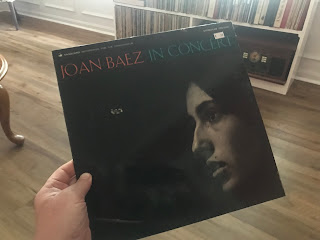I'm downsizing my album collection.
See that cabinet behind the Joan Baez record? I picked it up at a Salvation Army store in Cary, North Carolina, about 20 years ago, and I decided then that the number of albums it contained would be the number of albums that I owned. I was still single and living in apartments at the time, and I had been teetering for years on gathering enough albums to be one of those guys who starts putting up plywood shelves around the walls of his garage to hold them. Except I didn't have a garage. So I cut myself down to this cabinet's worth of albums and, in the years since, have lived pretty strictly by a one-comes-in/one-goes-out discipline.
Now we've decided to move the record player off the top and down to the bottom-right shelf, and so I'm going to gradually let go of that cubby's worth of albums. I've got a few up on eBay. Some will go straight back to the Sally. I took a handful there this past weekend and came home with a B.J. Thomas that is going back out.
Anyway, I don't much want to write about those records that are departing. I do want to write from time to time about the ones that I decide to find space to keep, such as Joan Baez In Concert. It's good--13 live performances grabbed from different performances in 1962. My favorite is probably "Kumbaya," a song which I adore, but the most famous off the record is probably "Babe, I'm Gonna Leave You," which is said (on great Wikipedia) to have so caught Jimmy Page's fancy that he played it for Robert Plant the first time those two guys got together in 1968.
Perhaps we turn to folk music because feel too 'cabin'd, cribbed, confined' by the standards of our world, where to be cool is to be wise, and to avoid complications (such as other people's troubles) is the road to suburbia and its house so fine, a world where love is a sometime thing and the voice of the turtle-dove is hushed in the shadow of the mushroom cloud. Perhaps this is why we love those few singers who are willing to expose their inner feelings (their souls, if you will) and speak in song of those things which are buried so deeply within us.
... And like all living things, like a person or a character in a novel, it can be appreciated and analyzed from so many (perhaps infinite) points of view, has so many areas of relevance and meaning, both objective and subjective, social and personal. In music and poetry (and folk song has both in equal parts), equal measurement and analysis isn't always possible, but most of us will feel meaning even if we can't quite freeze it into words.

"M.S." is almost certainly Maynard Solomon, who co-founded Vanguard Records with his brother Seymour in 1950, when Maynard was 20 years old. According to Wikipedia, Maynard produced many albums, and was a prolific writer of liner notes.
ReplyDeleteThe phrase "cabin'd, cribbed, confined" comes from Act III, Scene 4 of Macbeth, when Macbeth learns that one of his enemies is still alive. Here is part of his reaction to the news:
ReplyDeleteThen comes my fit again.
I had else been perfect,
Whole as the marble, founded as the rock,
As broad and general as the casing air.
But now I am cabin'd, cribbed, confined, bound in
To saucy doubts and fears.
The voice of the turtle dove is a reference to Song of Solomon 2:10-12. Here it is in the King James Version: "My beloved spake, and said unto me, 'Rise up, my love, my fair one, and come away. For lo, the winter is past, the rain is over and gone; the flowers appear on the earth; the time of the singing of birds is come, and the voice of the turtle is heard in our land.'"
ReplyDeleteFor roughly one generation before 1963, the American Left was very fond of showing off its learning -- of appearing to be deeply cultured, and capturing a broad range of cultural references covering everything from the Bible to English history to folk songs. So for someone like Maynard Solomon, it would make perfect sense to use Macbeth and the Song of Solomon to illustrate liner notes.
ReplyDeleteAfter the death of President Kennedy -- who was a master of this type of thing -- this approach to culture began to change. I have no idea why.